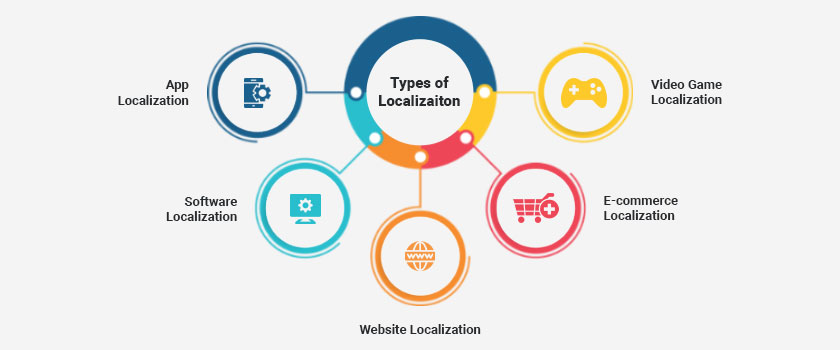The evolving world of today presents a host of opportunities for businesses. This is the reason why many of them opt for taking their operations to a global level. To be able to go global, however, it is first important to adapt your business according to the global market. For that, they have to hire expert localization services.
This ‘adaptation’, commonly known as localization is the adjustment of digital experience for the global customers. These customers live in another country and speak another language. While globalization requires adapting the business framework altogether, localization requires an adaptation of business code.
By simple definition, localization, also known as l10N, is the process of adapting a product or service according to the needs of a specific region. Translation and interpretation are only some of the several elements of the localization process.
Software and content localization has several elements that need to be modified for the global market. Examples of these elements include layout, graphics, text, multimedia, keyboard shortcuts, characters, and fonts. Other examples are related to products such as the build and packaging.
Businesses that seek to embrace localization have to first adopt a localization strategy. This localization strategy may be a unique market approach. A company can opt to change its operations to adjust to customer behavior, purchase habits, and cultural differences of the target market.
How is Country-specific Localization different from Language?
Localization is stepped ahead from mere translation. It ensures that a product and services should resonate with regional intricacies. Some factors like regional and local culture, market history, and accessibility to the regional market play a crucial role. Therefore, localization results in different outputs for various markets.
For instance, it needs not be bounded by geographic markets. Due to globalization, the multilingual population is increasing. Therefore, the businesses should resonate with the ethnic population in their native country. It gives leads to different localized versions that cater to different regions in the same target market.
In the case of big markets, language localization will help you reach a target market easily. The important thing to note is that different locals speak different dialects of the same language, For instance, the Spanish spoken in America is different from Spanish spoken in Canada. Localization considers this difference.
Localization also considers the multicultural aspect of the global world. It is not beyond the limitations of the specific countries. It focuses on reaching the target market on time so that they can build their trust in the potential market. Moreover, it helps to maintain a good brand image of the product and the service provider.
Why is Localization Important for Global Growth?
Do you want your products and services to be localized perfectly? For this, you need to go for internationalization. It helps your product and services to accept the different versions of data to resonate with the local customs. For example, if you are going for software localization then you need to consider the date, time, and currency. Moreover, you also need to consider language expansion and character limits. So that your customers can use your software easily without any hassle.
If you see localization from a linguistic point of view then you should consider originality and creativity for the translation version. Therefore, it helps to provoke native feelings in the target audience. Localization is not about altering the content for different target markets. Therefore, customers who purchase or use your product, will feel that product and services are developed for them.
In fact, localization is the key to get success in the global market. It helps to get connected with the specific market. Moreover, it helps you to attain quality, support, and credibility among the potential consumer base. If a potential buyer is unable to understand the specification of your products and services, then there is a probability that they will not use your products and services. In the same way, if your e-commerce business doesn’t follow local formatting and local mode of payment then it shows that your product is not up to the mark.
Localization’s Benefits to a Business
Localization plays an important role in global expansion. You can take advantage of markets with low conversion rates and turn them into lucrative opportunities. Human beings always want to be understood. Consumers at present are more aware than before so awareness among the consumers shapes their buying behavior.
Localization will help to navigate your websites and help the customers to make rational purchasing decisions. Therefore, localization is an important part of launching your product in the global market. It helps you in formulating your distribution strategies. Thus it results in increased revenue.
.One of the aspects of localization that many businesses ignore is its long-run benefit. Localizing your business according to the target market may seem like a tough task, but it has a lot of advantages. The investment you make in localization will pay you results quickly. It helps you in building a global customer base from the start of the business. Here we take a look at the numerous advantages that localization has.
Attracts global customers
With the help of localization, a business can excel in foreign markets. This is because by adapting your business according to the target market, the customer notices your brand more. Take, for example, a website that is present in English only. Not all global customers speak or understand English. When the website adapts its language according to the target market, the users are more likely to notice that website. This increases the user base, resulting in greater revenues for the business.
Leads to better brand identification
A business that has adapted its brand according to the target market becomes successful in getting its brand noticed. Many companies have adapted their products/services according to the target market. This has resulted in greater brand identification and a better brand image for the company. On the contrary, those brands which have failed to adapt themselves according to target markets have risked losing sales and revenue in those markets.
Increases profits and growth
Those companies which limited themselves to their native markets miss out on an important opportunity. This opportunity is related to international acclaim and profits. A company that has localized itself according to the target market would be liked by the target customer. This will result in greater acclaim for the company products, ultimately leading to more profits and revenue.
The Process of Localization
To many companies, the idea of localization may be daunting. However, the process of localization is easier than it seems. Once you have decided to go global, you can opt for translating your content. Your translation management process will determine how you localize. This will clear your path towards localization and would enable you to make informed decisions related to localization.
You will then need to hire a professional localization service that will adapt your content according to the target market. Working with an expert translation agency will ensure there are no errors in the translation process. This, in turn, would mean a smoother transition to the global market which is the aim of many companies.
The Types of Localization
Now that we have an idea of the benefits and processes of localization, let’s take a look at the most common types of localization. Companies hire expert translation agencies to localize their services according to target markets. Here are the types of localization.
Website Localization
One of the most common types of localization is website localization. With the growing influence of websites, it is no surprise that companies opt for website localization. This involves the adaptation of website features such as language, fonts, graphics, text, and layout.
E-commerce Localization
As the world opts for E-commerce stores over physical retail stores, localizing these E-commerce platforms has become even more important. Examples of E-services include localization of E-commerce stores, E-learning sites, online shopping, and apps. With a localized E-commerce platform, the barriers to entry are lowered. This allows a company a chance to introduce more offerings in that market, hence increasing the revenue margin and profits.
App Localization
Another common type of localization is app localization. As companies across the world introduce apps for global customers, the need to localize them has also increased. This is the reason why many apps are available in multiple languages today. Localization experts would help in adapting app features according to target markets. Mobile app localization is one of the most important types of app localization. With the huge number of mobile app users, localizing mobile apps is the need of the hour.
Video Game Localization
Just like the localization of documents, apps, and E-services, video game localization also holds utmost importance. The video games market is a huge one, which is increasing with each passing day. Localizing video games provides a greater edge to companies. This is because people want to play games in the language they understand. Localizing a video game means greater revenues and more profits—something that companies are looking for.
Software Localization
A company’s software is a clear picture of its offerings. This is why it is important to localize software according to target market needs. Localizing software involves adapting the user-visible components of the software such as images, graphics, and user interface. By localizing these elements of software, companies stand a better chance of getting their software noticed in a global market.
Other types of Localization
Other than the types discussed above, localization has many other types. It covers various types of material, both digital and written. One of the most important elements to localize is the company website. As a business enters a foreign market that has a different culture, language, and preferences, it needs to appear local. This is where adapting a website comes into play.
Other materials that need localization are movies, documents, subtitling, and marketing content localization. This involves the localization of advertising material and promotional strategies. Moreover, localization needs to be done for different industries such as automotive, tech, games, and medical industry, etc.
Scope of Localization
Localization is mostly used with translation. Apart from seamless translation in the target market. It deals with several other things that are as follows.
- Using the interface of your website according to the preference of the target market.
- The content of the website should resonate with consumer behavior.
- The display of the website should accommodate the expansion and contraction of translated content.
- Payment of mode and measurements should be according to the local requirements.
- Addresses, dates, and phone numbers should be according to the local audience.
- Abiding by all legal and local requirements.
- Addressing all legal requirements and local regulations.
The Difference between Localization and Translation
Although translation is one of the many elements of localization, there are differences between the two. When you translate, you are transforming your message from one language to another. The translation aims to make the target audience understand what they are reading.
Here, a translator is of utmost importance. He should use his skill to present a message in a way that it sounds just like the original one. Moreover, a translator’s task is to cater to a wider audience that speaks the language you are translating into.
On the other hand, when localizing, a translator addresses a more specific audience. Localization involves an adaptation not only of the language but also the adaptation of numbers, graphics, and other elements.
Also, localization is more sensitive to the local culture and therefore, caters to a specific audience. In essence, localization goes beyond translation. Translation, on the other hand, involves catering to the target audience’s needs related to language.
The Last Word
A business cannot stay confined to its native market. This is something that many companies now understand. For it to become internationally recognized, it has to follow globalization strategies. Globalization is the ‘re-formatting of the whole business framework. Localization, just like globalization, is critical for business success.
It involves adapting the minute elements of a business that are often overlook by companies. Through localization, a company can make global revenues and profits. It also enhances its brand image and acclaim, leading to a greater global footprint and greater global success.
Read More information:
Top 7 Website Localization Tools
7 Best Practices Following for Software Localization





